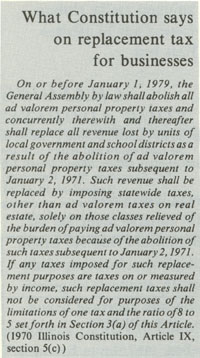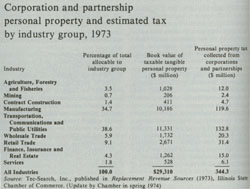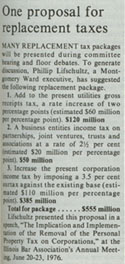By CHARLES MINERT
A research associate for the Illinois
Legislative Council in Springfield, he
holds degrees in political science from
Park College, Kansas City, Mo., and the
University of Illinois, Chicago Circle
Campus.
No longer in existence after January 1979
*Personal property tax
 |
UNLESS THE General Assembly acts
promptly, local governments throughout Illinois stand to lose as much as $585
million annually. Without these replacement revenues, many local governments
will face a financial crisis.
The personal property tax on individuals — but not businesses — was
abolished on January 1, 1971. For six
years the General Assembly has been on
notice that it must also abolish, by
January 1, 1979, the personal property
tax levied on corporations, partnerships, limited partnerships, joint ventures, professional associations, and
professional service corporations. Not
only does the Constitution require the
abolition of this tax on these businesses,
it also requires that the General Assembly replace the lost revenue with a new
tax on these businesses by the same 1979
date. So far, it has done neither.
Big job ahead for legislators
Undoubtedly, the General Assembly's delay in implementing this constitutional mandate is attributable to the
impending clash between the business
community and local governments.
Business interests will strenuously lobby
for legislation which will not increase
their tax burden and local governments
will press for legislation which will
assure an expanding tax base. In spite of
these tensions, the General Assembly
can no longer defer action. If they do,
local governments could go bankrupt.
The extent of the General Assembly's
task is revealed by a phrase by phrase
analysis of section 5(c) of Article IX in
the Constitution.
|
First, the General Assembly is required to abolish the personal property
tax and "... replace all revenue lost by
units of local government and school
districts as a result of the abolition of ad
valorem personal property taxes subsequent to January 2, 1971," that is, by
the property taxes on business to be
eliminated on January 1, 1979. Second,
all replacement revenues must come
from statewide taxes. Third, no replacement revenues can come from
taxes on real property. Fourth, replacement taxes may only be imposed
on those taxpayer classes relieved of
paying the personal property tax (businesses). Fifth, replacement taxes may be
based on the income of businesses,
corporations, et cetera.
The General Assembly's task is formidable. Determinations must be made
regarding the amount of personal
property tax collections and the replacement tax packages which will yield
an equal amount. Taxpayer classes must
be identified and evaluated in terms of
their capabilities to produce replacement revenues. Methods of allocating
replacement revenues and their impact
on local governments must be analyzed.
Finally, the General Assembly must
consider the ramifications if they fail to
enact replacement taxes. Given the
politically charged atmosphere in which
this issue will be discussed, it is important that some fiscal guidelines be
established so that replacement tax
packages that are proposed can be
evaluated properly.
Criteria for replacement taxes
In Replacement Revenue Sources, a
1973 study commissioned by the Illinois
State Chamber of Commerce, Dr. Robert Schoeplein suggests four basic
criteria: (1) the replacement taxes must
provide adequate revenues and be responsive to economic growth without
frequent rate changes; (2) the replacement taxes should fit into existing tax
collection and administrative machinery. Taxes which do not require increased
administrative costs to the state and the
taxpayer should be very carefully considered; (3) the replacement taxes must
18 / March 1977 / Illinois Issues
|
Mandated to replace revenues lost to school
districts and local governments with new taxes on
businesses, the General Assembly must decide
soon to change tax laws
or propose a constitutional referendum
be equitable so that taxpayers in the
same class should be subject to like taxes
and taxpayers of varying income and
wealth should be subject to different
tax burdens, according to their ability
to pay; (4) the replacement taxes must
be considered in the light of their economic impact on employment, migration and business investment.
One of the General Assembly's crucial
tasks is to accurately estimate the
amount of personal property tax revenues which must be replaced. Many
estimates will be made and the General
Assembly must pick and choose among
them. Recent data from the Illinois
Department of Local Government
Affairs indicates that 1974 statewide
personal property taxes, collectible in
1975, will total approximately $530
million. Assuming that about 15 per
cent of these taxes will not be collected,
the statewide personal property tax collections for 1975 will be about $450
million. Using this figure as a base and
assuming a 10 per cent annual increase
in collections for 1976, 1977, and 1978,
the statewide collections should total
about $585 million by January 1, 1979.
Burden on businesses
Any evaluation of taxpayer classes
must take into consideration that part of
section 5(c) which states that the
replacement burden must fall solely on
those taxpayers ". . . relieved of the
burden-of paying ad valorem personal
property taxes because of the abolition
of such taxes subsequent to January 2,
1971," that is, on businesses. Taxes on
personal property owned by individuals
were abolished by the adoption of
Article IX-A to the 1870 Illinois Constitution on November 3, 1970. The
effective date of this article was January
1, 1971. After this date and until January 1, 1979, only businesses pay
personal property taxes.
The Constitutional Convention anticipated the ratification of Article IX-A
by including section 5(b) in Article IX of
the 1970 Constitution. Section 5(b)
states that "[A]ny ad valorem personal
property tax abolished on or before the
effective date of this Constitution shall
not be reinstated." Consequently, only
personal property owned by corporations, partnerships, limited partnerships, joint ventures, professional
associations and professional service
corporations is currently subject to the
personal property tax. Any replacement
taxes will fall on these taxpayer classes.
In Replacement Revenue Sources,
the Illinois State Chamber of Commerce provides a detailed analysis of
taxpayer classes according to industry
groupings. The chamber's 1973 estimate
of the percentages of total corporation
|
|
Survey of statewide organizations on replacement tax issue
SPOKESMEN FOR 38 organizations
which have registered' lobbyists were asked
to comment on the personal property tax
replacement issue. Seven responses were
received. An increase in the income tax was
conceded to be the basic replacement source,
but five of the seven favored changing the
Constitution to retain the existing personal
property tax. A summary of replies follows:
David F. Ellsworth, state chairman,
Common Cause / Illinois, who emphasized
that the views expressed were his own, said
he favored amending the Constitution to
allow a personal to corporate income tax
ratio of 2:1 and raising corporate income
taxes to the level needed to replace the
existing tax. Alternatives to an increased
income tax might include a value-added tax
or retaining the existing tax, provided this is
tied to reform of the state administration of
the property tax.
Len Gardner, secretary, Illinois Agricultural Association, cited a resolution adopted by I.A.A. delegates at a meeting early in
December favoring a constitutional amendment to retain the existing personal property
tax.
Harold Dodd, president, Illinois Farmers
Union, favors amending the Constitution to
retain the tax. His alternative is an increased
income tax for replacing lost revenue.
Oscar A. Weil, legislative director, Illinois
Federation of Teachers, says, "Those who
supported the Constitution of 1970 assumed
the revenue from the income tax would be
used to lessen the tax burden on property
and to replace revenue lost by abolition of
the tax on personal property." He opposes
amending the Constitution to retain the
personal property tax, contending such a
move "would tend to erode the credibility of
state government." He favors amending the
Constitution to permit a graduated income
tax "not only to replace revenue lost from
elimination of the personal property tax, but
to allow reduction of the tax burden on nonincome producing real property."
William E. Stowe, Illinois State Chamber
of Commerce, favors a "balanced combination [of replacement taxes] to avoid massive
shifting of tax burden between groups,"
including an increased income tax as part of
the package. In opposition to amending the
Constitution to retain the existing tax, he
states, "This is a dangerous idea, advocated
by special interests."
Troy A. Kost, executive director. Township Officials of Illinois, favors retaining the
existing personal property tax by constitutional amendment. If this cannot be done,
Kost said, the state income tax should be
increased to replace lost tax revenues.
Urban Counties Council of Illinois
suggested a combination of sales, income
and public utility taxes as a replacement "to
insure that no shifting in the tax burden
occurs." Retention of the personal property
tax is seen as "the only solution" to insure
that no shifting occurs.
|
|
March 1977 / Illinois Issues / 19
Pressure is on the General Assembly
to get down to business and
avoid a fiscal and constitutional crisis in 1979
and partnership personal property of
each industry grouping, the book value
of taxable tangible personal property,
and the personal property tax collected
from corporations and partnerships is
illustrated in the table below.
In considering particular replacement
tax packages, the General Assembly
must take note of the section 5(c)
directive requiring that replacement
taxes come from ". . . statewide taxes,
other than ad valorem taxes on real
estate." The reference to "statewide
taxes" implies that the Constitutional
Convention intended that replacement
revenues come from a package of two or
three taxes, rather than a single tax.
Section 5(c) also states that "[I]f any
taxes imposed for such replacement
purposes are taxes on or measured by
income, such replacement taxes shall
not be considered for purposes of the
limitations of one tax and the ratio of 8
to 5 set forth in Section 3(a) of this
Article." Thus, a surtax on income may
be considered as a viable replacement
alternative. In addition, it is important
to recognize that there is no constitutional requirement that taxpayer classes
currently subject to the personal property tax must pay exactly the same
amount under any replacement tax
alternative.
Allocation of new revenues
When considering methods for allocating replacement revenues, the General Assembly has two alternatives: direct dollar for dollar replacement or
replacement based on something other
than an absolute dollars lost criteria. In
either case, the General Assembly will
have to devise an allocation formula
which will insure an equitable distribution of the additional revenues the
replacement taxes will generate.
All of the foregoing presupposes that
the General Assembly will pass a replacement tax package. There is,
however, a possibility that the General
Assembly will not pass the necessary
legislation by January 1, 1979. The
opening sentence of section 5(c) states
that"[0]n or before January 1, 1979, the
General Assembly by law shall abolish
all ad valorem personal property taxes
and concurrently therewith and thereafter replace all revenue lost by units of
local government and school districts . . . ."
Dilemma for Supreme Court
There is some dispute regarding the
meaning and intent of this language.
The ramifications of this dispute were
dealt with by the Illinois Supreme Court
in Elk Grove Engineering v. Korzen.
Dicta in the majority opinion stated that
". . . the provisions of section 5(c)
constitute a mandate to the General
Assembly to abolish all ad valorem
taxes on personal property on or before January 1, 1979; that the provision is
not self-executing and legislation is both
contemplated and necessary to carry it
into effect; and that the provision does
not require that all such taxes be
abolished at one and the same time but
the General Assembly is under a continuing duty to effect their abolition on or
before January 1, 1979."
The dissent held that the personal
property tax is abolished on January 1,
1979, and the constitutional mandate
for replacement taxes cannot be judicially enforced.
|
If the taxes are not abolished and
replaced, a lawsuit will undoubtedly be
filed to determine the effect of section
5(c). If this happens, the Supreme Court
will face a serious dilemma. If it allows
the personal property tax to be collected
after January 1, 1979, section 5(c) is
meaningless. The imposition of another
deadline would be just as unenforceable
as the January 1,1979, date. If the court
refuses to allow the collection of the tax
after January 1, 1979, it is powerless to
enforce the General Assembly's constitutional mandate to replace lost revenues.
All personal property taxes paid after
January 1, 1979, will be protested and
held in escrow accounts until the court
decides on the legality of the personal
property tax. Recognizing the unenforceable nature of the replacement
mandate, the court could, nevertheless,
order that the protested taxes be held in
these accounts until the General Assembly
|

|
20 / March 1977 / Illinois Issues
|
enacts replacement taxes. The
pressure would then shift to the General
Assembly to deliver on its replacement
mandate. All of these possibilities
indicate that section 5(c) is seriously
flawed because it is not self-executing
and the replacement provisions are not
judicially enforceable.
The General Assembly could resolve
this dilemma by calling for a referendum
to amend section 5(c). Several alternatives are possible. First, the amendment
could change the date and buy more
time for General Assembly action.
Second, the amendment could change
the date and delete the replacement
provision, thereby averting an immediate fiscal crisis on the local governmental level. Third, the amendment
could delete the replacement provisions.
Senate Joint Resolutions 33 and 67 and
House Joint Resolution 27, introduced
in the 79th General Assembly, adopted
this alternative. Fourth, the amendment
could repeal section 5(c).
As January 1, 1979 approaches,
pressure to make a decision will increase. Delay and avoidance of this issue
are no longer possible if local governments are to have uninterrupted tax
revenues to support their services.
|

|
20 / March 1977 / Illinois Issues


